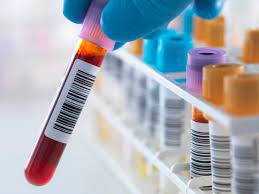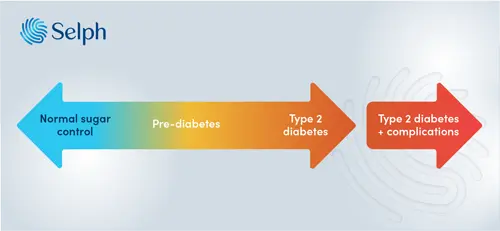How do you know if I have prediabetes?

You don’t. That’s the point. You will have no symptoms.
In this way, it is a silent disease, like blood pressure or high cholesterol. It can only be diagnosed with blood tests.
This is why, in this article we will describe how you test for prediabetes. First of all, some basics.
What is prediabetes?
Prediabetes (or sometimes called borderline diabetes), is when your body starts to show signs a raised blood glucose (sugar). You won’t have any symptoms with pre-diabetes and your blood sugar levels can even be normal or near to normal.
Prediabetes is a ‘warning-shot’ for diabetes. You need to pay attention to it, and respond to it.
This involves lifestyle change, and if overweight, you need to lose weight, and keep it down.
Type 2 diabetes isn’t a sudden thing that happens overnight. It develops over time. You go from normal sugar control to pre-diabetes to diabetes (and back).

So. How do you test for prediabetes?
How can you tell if you are prediabetic without any symptoms?
The only way you (and we docs!) can tell if you have prediabetes is by having a blood test for something called HbA1c (haemoglobin A1c). Sugar in your blood sticks to some of the haemoglobin in your red blood cells. Higher blood sugars means you have more glucose stuck to haemoglobin.
This ‘sugary haemoglobin’ is called HbA1c. How much HbA1c you have can tell us your average blood sugar levels in the last 3 months.
If you are prediabetic then you’ll have higher than normal HbA1c levels, but below diabetic levels (see below).
And how to you diagnose prediabetes (and diabetes)?
Blood glucose in prediabetes (and diabetes)
- Normal human blood sugar = 4-6 mmol/L
- Prediabetes is diagnosed if your random blood sugar = 7-11 mmol/L
- (Diabetes is diagnosed if you have a random blood sugar > 11 mmol/L (or a fasting blood sugar > 7 mmol/L)).
HbA1C in prediabetes (and diabetes)
- Normal HbA1c = 20-42 mmol/mol (or 4-6%)
- Prediabetes is diagnosed if your HbA1c = 42-47 mmol/L (6-6.5%)
- (Diabetes is diagnosed if your HbA1c = 48 mmol/mol or over (>6.5%)).
Summary
In this article we have described how you know if you have prediabetes, how you test for it, and what you can do to help yourself.
Remember its a warning shot. You need to do something. This involves lifestyle change, and if overweight, you need to lose weight, and keep it down.

